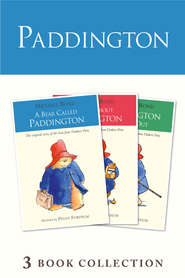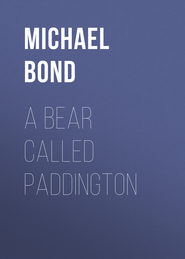По всем вопросам обращайтесь на: info@litportal.ru
(©) 2003-2025.
✖
Paddington Complete Novels
Настройки чтения
Размер шрифта
Высота строк
Поля
And, despite his protests, he was sent upstairs that afternoon with a bath cube and some soap and strict instructions not to come down again until he was clean.
Excitement in the Browns’ house mounted during the afternoon and by the time Mr Gruber arrived, looking self-conscious in an evening-dress suit which he hadn’t worn for many years, it had reached fever pitch.
“I don’t think I’ve ever been to the Porchester before, Mr Brown,” he whispered to Paddington in the hall. “So that makes two of us. It’ll be a nice change from cocoa and buns.”
Paddington became more and more excited on the journey to the restaurant. He always enjoyed seeing the lights of London and even though it was summer quite a few of them had already come on by the time they got there.
He followed Mr Brown up the steps of the restaurant and in through some large doors, giving the man who held them open a friendly wave of his paw.
In the distance there was the sound of music and as they all gathered inside the entrance in order to leave their coats at the cloakroom, Paddington looked around with interest at the chandeliers hanging from the ceiling and at the dozens of waiters gliding to and fro.
Here comes the head waiter,” said Mr Brown, as a tall, superior-looking man approached. “We’ve booked a table near the orchestra,” he called. “In the name of Brown.”
The head waiter stared at Paddington. “Is the young… er… bear gentleman with you?” he asked, looking down his nose.
“With us?” said Mr Brown. “We’re with him. It’s his party.”
“Oh,” said the man disapprovingly. “Then I’m afraid you can’t come in.”
“What!” exclaimed Paddington amid a chorus of dismay. “But I went without a second helping at lunch specially.”
“I’m afraid the young gentleman isn’t wearing evening dress,” explained the man. “Everyone at the Porchester has to wear evening dress.”
Paddington could hardly believe his ears and he gave the man a hard stare.
“Bears don’t have evening dress,” said Judy, squeezing his paw. “They have evening fur – and Paddington’s has been washed specially.”
The head waiter looked at Paddington doubtfully. Paddington had a very persistent stare when he liked, and some of the special ones his Aunt Lucy had taught him were very powerful indeed. He coughed. “I daresay,” he said, “we might make an exception – just this once.”
He turned and led the way through the crowded restaurant, past tables covered with snowy white cloths and gleaming silver, towards a big round table near the orchestra. Paddington followed on close behind and by the time they reached it the man’s neck had gone a funny shade of red.
When they were all seated the head waiter gave them each a huge card on which was printed a list of all the dishes. Paddington had to hold his with both paws and he stared at it in amazement.
“Well, Paddington,” said Mr Brown. “What would you like to start with? Soup? Hors d’æuvre?”
Paddington looked at his menu in disgust. He didn’t think much of it at all. “I don’t know what I would like, Mr Brown,” he said. “My programme’s full of mistakes and I can’t read it.”
“Mistakes!” The head waiter raised one eyebrow to its full height and looked at Paddington severely. “There is never a mistake on a Porchester menu.”
“Those aren’t mistakes, Paddington,” whispered Judy, as she looked over his shoulder. “It’s French.”
“French!” exclaimed Paddington. “Fancy printing a menu in French!”
Mr Brown hastily scanned his own card. “Er… have you anything suitable for a young bear’s treat?” he asked.
“A young bear’s treat?” repeated the head waiter haughtily. “We pride ourselves that there is nothing one cannot obtain at the Porchester.”
“In that case,” said Paddington, looking most relieved, “I think I’ll have a marmalade sandwich.”
Looking around, Paddington decided a place as important as the Porchester must serve very good marmalade sandwiches, and he was anxious to test one.
“I beg your pardon, sir?” exclaimed the waiter. “Did you say a marmalade sandwich?”
“Yes, please,” said Paddington. “With custard.”
“For dinner?” said the man.
“Yes,” said Paddington firmly. “I’m very fond of marmalade and you said there was nothing you don’t have.”
The man swallowed hard. In all his years at the Porchester he’d never been asked for a marmalade sandwich before, particularly by a bear. He beckoned to another waiter standing nearby. “A marmalade sandwich for the young bear gentleman,” he said. “With custard.”
“A marmalade sandwich for the young bear gentleman – with custard,” repeated the second waiter. He disappeared through a door leading to the kitchens as if in a dream and the Browns heard the order repeated several more times before it closed. They looked around uneasily while they gave another waiter their own orders.
There seemed to be some sort of commotion going on in the kitchen. Several times they heard raised voices and once the door opened and a man in a chef’s hat appeared round the corner and stared in their direction.
“Perhaps, sir,” said yet another waiter, as he wheeled a huge trolley laden with dishes towards the table, “you would care for some hors d’æuvre while you wait?”
“That’s a sort of salad,” Mr Brown explained to Paddington.
Paddington licked his whiskers. “It looks a very good bargain,” he said, staring at all the dishes. “I think perhaps I will.”
“Oh dear,” said Mrs Brown, as Paddington began helping himself. “You’re not supposed to eat it from the trolley, Paddington.”
Paddington looked most disappointed as he watched the waiter serve the hors d’æuvre. It wasn’t really quite such good value as he’d thought. But by the time the man had finished piling his plate with vegetables and pickles, salad, and a pile of interesting-looking little silver onions he began to change his mind again. Perhaps, he decided, he couldn’t have managed the whole trolleyful after all.
While Mr Brown gave the rest of the orders – soup for the others followed by fish and a special omelette for Mr Gruber – Paddington sat back and prepared to enjoy himself.
“Would you like anything to drink, Paddington?” asked Mr Brown.
“No, thank you, Mr Brown,” said Paddington. “I have a bowl of water.”
“I don’t think that’s drinking water, Mr Brown,” said Mr Gruber tactfully. “That’s to dip your paws in when they get sticky. That’s what’s known as a paw bowl.”
“A paw bowl?” exclaimed Paddington. “But I had a bath this afternoon.”
“Never mind,” said Mr Brown hastily. “I’ll send for the lemonade waiter – then you can have an orange squash or something.”
Paddington was getting more and more confused. It was all most complicated and he’d never seen so many waiters before. He decided to concentrate on eating for a bit.
“Most enjoyable,” said Mr Gruber a few minutes later when he had finished his soup. “I shall look forward to my omelette now.” He looked across the table at Paddington. “Are you enjoying your hors d’æuvre, Mr Brown?”
“It’s very nice, Mr Gruber,” said Paddington, staring down at his plate with a puzzled expression on his face. “But I think I’ve lost one of my onions.”
“You’ve what?” asked Mr Brown. It was difficult to hear what Paddington was saying for the noise the orchestra was making. It had been playing quite sweetly up until a moment ago but suddenly it had started making a dreadful row. It was something to do with one of the saxophone players in the front row. He kept shaking his instrument and then trying to blow it, and all the while the conductor was glaring at him.
“My onion!” exclaimed Paddington. “I had six just now and when I put my fork on one of them it suddenly disappeared. Now I’ve only got five.”
Mrs Brown began to look more and more embarrassed as Paddington got down off his seat and began peering under the tables. “I do hope he finds it soon,” she said. Everyone in the restaurant seemed to be looking in their direction and if they weren’t actually pointing she knew they were talking about them.












